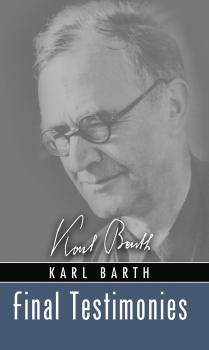Karl Barth
Список книг автора Karl BarthFinal Testimonies
The five brief pieces collected here represent the final words prepared by Karl Barth for publication, all of them originating during the period from his serious illness in August of 1968 to his death in December of that same year. The final selection is a fragment left unfinished the night he died.
The last word that I have to say as a theologian or politician is not a concept like grace but a name: Jesus Christ. He is grace and he is the ultimate one beyond world and church and even theology. We cannot lay hold of him. But we have to do with him.... There is no salvation but in this name. In him is grace.
Karl Barth, 'Final Testimonies'
The Faith of the Church
The Apostles' Creed is the foundation of Christian faith. The interpretive version of the Apostles' Creed formulated by the Swiss reformer John Calvin in his Catechism has been the basis of Protestant theological education for centuries. In The Faith of the Church, Karl Barth, one of the powerful and enduring theologians of modern Protestantism, reinterprets the Apostles' Creed according to the Catechism of Calvin.
The theology of Karl Barth has been one of the mobilizing influences of modern religious thought. Repudiating as he does every theological accent which permits man either self-sufficiency or independence from the action and grace of God, Barth takes seriously (as few contemporary Protestant theologians have taken seriously) the meaning of the Catechism-which is to direct man to the knowledge of God. His interpretations of the Catechism, organized according to the Questions of the Catechism, are unimpaired by technical language or jargon. They are direct, moving, and exceedingly penetrating. This is not a work to employ the attentions of those indifferent to the heart of Christian faith. It is a work calculated, however, to disturb and deepen the faith of those who imagine themselves already Christian.
Christ and Adam
In this essay, Barth discusses the relationship between Christ and Adam as understood by Paul. Moving beyond traditional exegetical and theological scholarship done on Romans 5, Barth offers an entirely new interpretation of the conception of humanity presented in Paul's view of the Christ-Adam relationship. A valid contribution to the interpretation of Romans 5, 'Christ and Adam' is also an example of Barth's exegetical method and provides insight into his broader theological project.
Community, State, and Church
Karl Barth was the master theologian of our age. Whenever men in the past generation have reflected deeply on the ultimate problems of life and faith, they have done so in a way that bears the mark of the intellectual revolution let loose by this Swiss thinker.
But his life was not simply one of quiet reflection and scholarship. He was obliged to do his thinking and writing in one of the stormiest periods of history, and he always attempted to speak to the problems and concerns of the time. In June 1933 he emerged as the theologian of the Confessional movement, which was attempting to preserve the integrity of the Evangelical Church in Germany against corruption from within and terror from without. His leadership in this struggle against Nazism also made it necessary for him to say something about the totalitarianism that the Soviet power was clamping down upon a large part of Europe. In this indirect way, a Barthian social philosophy emerged, and this theologian, who abjured apologetics and desired nothing but to expound the Word of God, was compelled by circumstances to propound views on society and the state that make him one of the most influential social thinkers of our time.
David Haddorff is Associate Professor of Theology and Religious Studies at St. John's University, New York. He is the author of several articles and reviews, and the book: Dependence and Freedom: The Moral Thought of Horace Bushnell (1994).
Table of Contents:
Introduction by David Haddorff – Karl Barth's Theological Politics 1
Gospel and Law 71
Church and State 101
The Christian Community and the Civil Community 149
Bibliography 191






